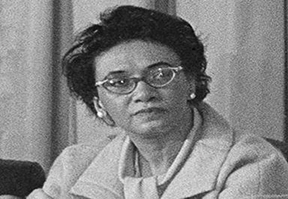
By Herb Boyd
(Source Amsterdamnews.com):
Frankie Muse Freeman came to me during a conversation with Dr. Marcella Maxwell. She shared with me her remarks about her good friend Dr. Hazel Nell Dukes and other recipients of the Spingarn Medal, including Ms. Freeman. All the women she cited were familiar names, but Freeman’s was new to me and thus began my pursuit.
Her birth name was Marie Frankie Muse, and she was born on November 24, 1916, in Danville, Virginia. Her parents, Maude Beatrice Smith Muse and William Brown Muse, came from college-educated families. Among her relatives were Charles Sumner Muse, Edward Muse, and Clarence Muse, the acclaimed writer and actor. As a child, she attended Westmoreland School, where she studied music, especially the piano.
A fast learner, she was 16 when she enrolled in Hampton Institute, her mother’s alma mater, between 1933 and 1936. At some point, she visited New York, where she met and married Shelby T. Freeman. In 1944, she was admitted to Howard University Law School, where William H. Hastie and Spottswood Robinson were two of her teachers. She was an outstanding student, graduating second in her class in 1947.
Two years later, she opened her law office in the Jefferson Bank Building and immediately began her long participation in the Civil Rights Movement. In the NAACP’s Brewton v. the Board of Education of St. Louis in 1949, Freeman, Sidney Redmond, Robert Witherspoon, and Henry Espy were the attorneys who argued that case to victory. In 1954, the same year of Brown v. the Board of Education, she was the lead attorney for the landmark NAACP case, Davis et al v. the St. Louis Housing Authority, ending racial discrimination in housing.
Freeman became the first associate general counsel for the St. Louis Housing Authority and Land Clearance Authority. Her ascendance continued in 1958 when she became a charter member of the Missouri advisory committee to the U.S. Commission on Civil Rights. Eventually, she provided NAACP counsel to CORE activists demonstrating against hiring discrimination policies at Jefferson Bank.
President Lyndon Johnson recognized her considerable skills and talent and, in 1964, appointed her as the first female member of the U.S. Commission on Civil Rights, a post in which she served for 16 years. Later, during the Carter administration, she served as Inspector General for the Community Services Administration. She was also a municipal court judge in the 1970s. A tireless advocate, Freeman helped form a bipartisan Citizens Commission on Civil Rights to monitor the federal government’s enforcement of laws barring discrimination in 1982. Freeman was a practicing attorney for more than 50 years.
She sat on many boards, including the Trustees of Howard University, the National Council on Aging, the Urban League of Metropolitan St. Louis, the United Way of Greater St. Louis, the Metropolitan Zoological Park, the St. Louis Center for International Relations, and the Museum District. She was also a national president of Delta Sigma Theta Sorority, Inc. Along with the Spingarn Medal, she received honorary doctorates from Hampton University, Washington University in St. Louis, and Howard University. She was inducted into the National Bar Association’s Hall of Fame in 1990 while she was still practicing law.
In 2003, she published her memoir, A Song of Faith and Hope. There is a statue of her in downtown St. Louis. She died in 2018 at 101 years old.


Be the first to comment